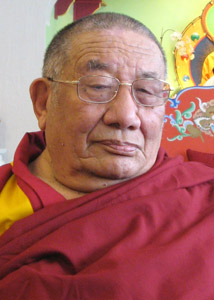Name: Ngawang Dakpa, Geshe
(Alias: No)
Gender: Male
Interview Age: 80
Date of Birth: 1933
Birthplace: Nagchu, Utsang, Tibet
Year Left Tibet: 1959
Profession: Monk
Monk/Nun: Currently
Political Prisoner: No

Interview No.: 2C
Date: 2013-04-26
Language: Tibetan
Location: San Francisco, California, United States
Categories: Buddhist Traditions
Keywords: astrology, Buddhist beliefs, childhood memories, March 10th Uprising, monastic life, nomadic life, resistance, Utsang
Summary:
Geshe Ngawang Dakpa was born in Nagchukha into a nomadic family. The family reared yak, goats and sheep, but did not need to move often. Geshe Ngawang Dakpa reveals that he was a naughty child who broke his toys and hid from his parents.
Geshe Ngawang Dakpa recalls how he was inducted into monkhood at the age of 10. He explains the process of memorizing scriptures and the desire he had to study Tibetan medicine and astrology. He describes the types of astrology and the uses of these astrological calculations in everyday life of the Tibetans.
Geshe Ngawang Dakpa was praised as one of the top students and longed to go to Sera Monastery near Lhasa for further studies. He was finally permitted to enroll in Sera in 1954 and was given the opportunity to participate in philosophical debates. He describes how the debates are conducted between monks.
Geshe Ngawang Dakpa describes his experience of the turmoil in Lhasa in 1959 as a result of the Chinese occupation. Many monks left Sera Monastery to collect guns and defend themselves against Chinese attacks. Geshe Ngawang Dakpa witnessed the shelling of the Norbulingka and Potala Palaces, the smoke and dust rising around the city, and monks and laypeople fleeing.
Interview Team:
- Marcella Adamski (Interviewer)
- Tony Sondag (Videographer)
- Nyima Tsam (Interpreter)

